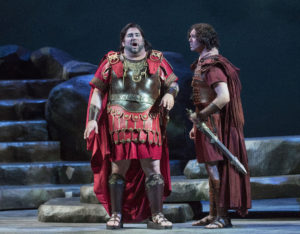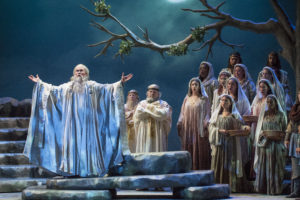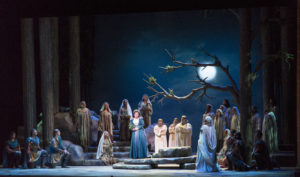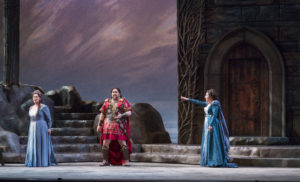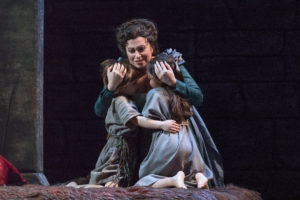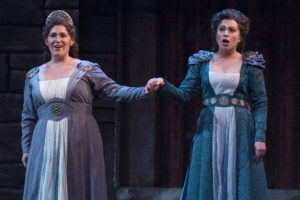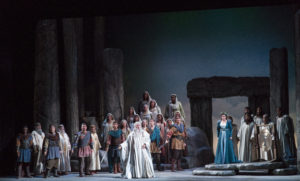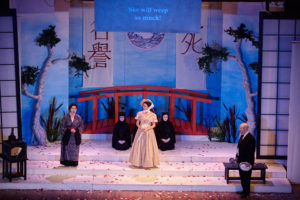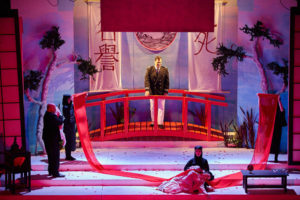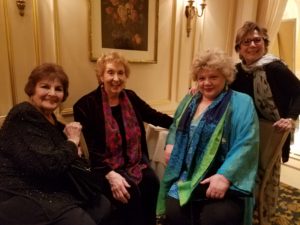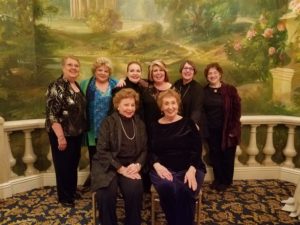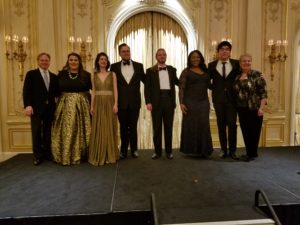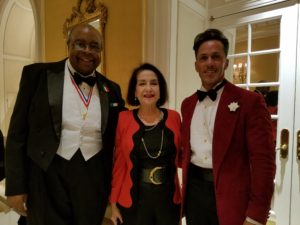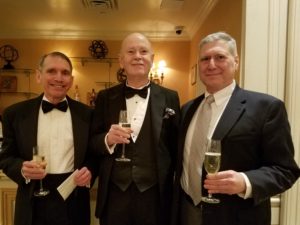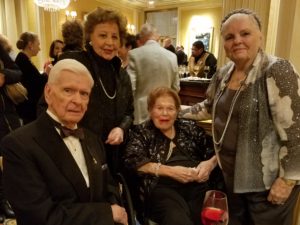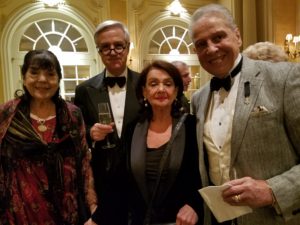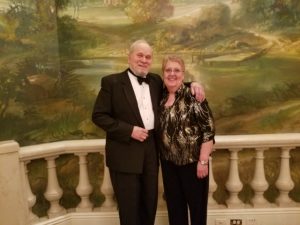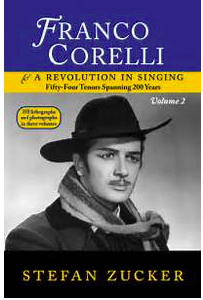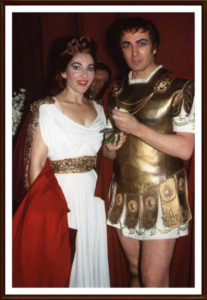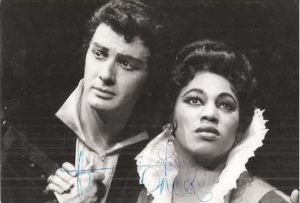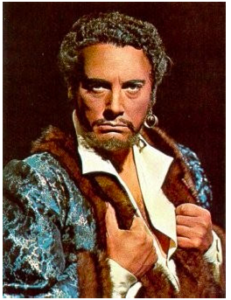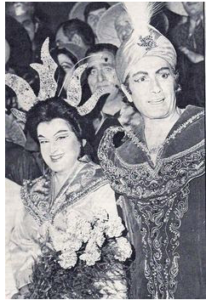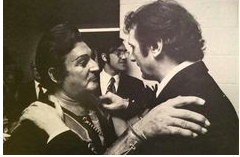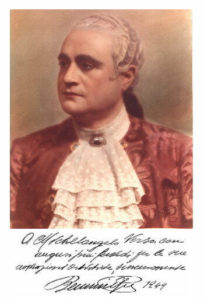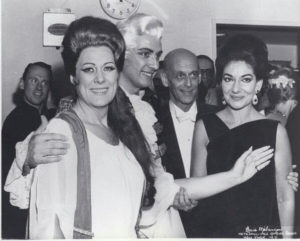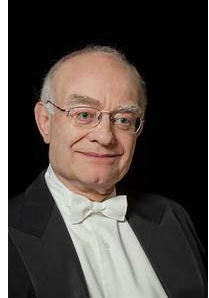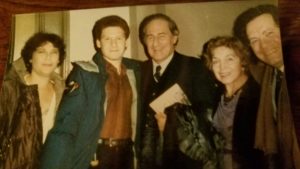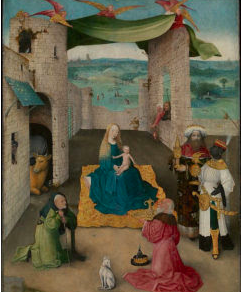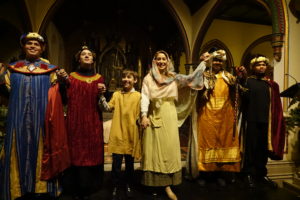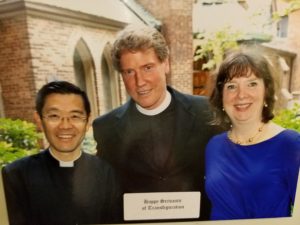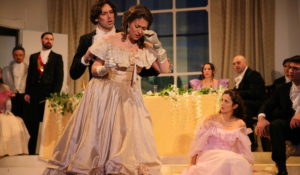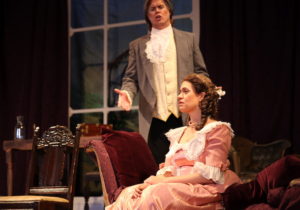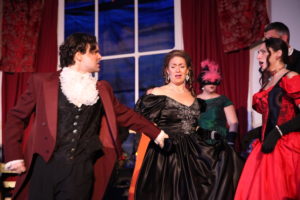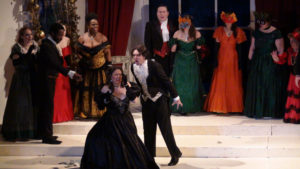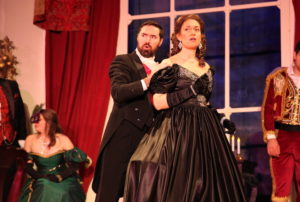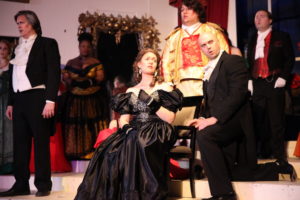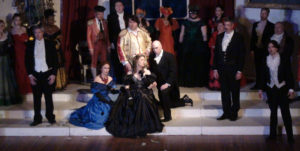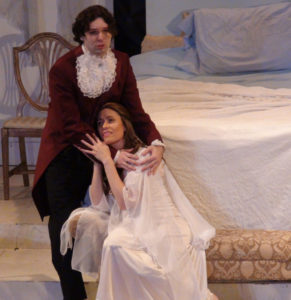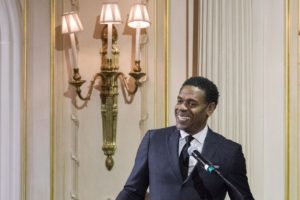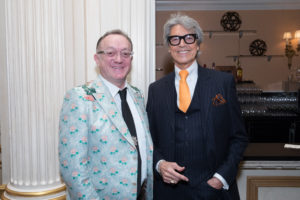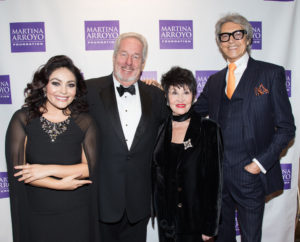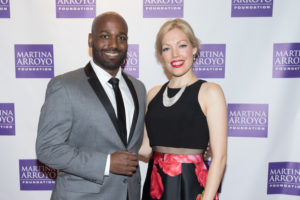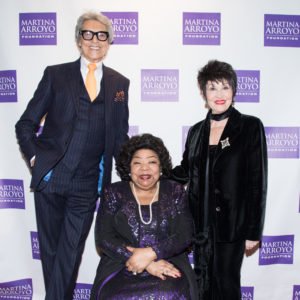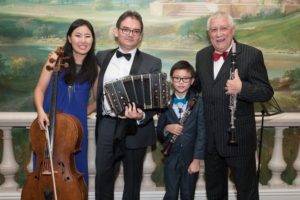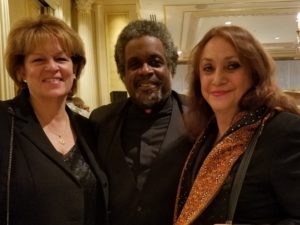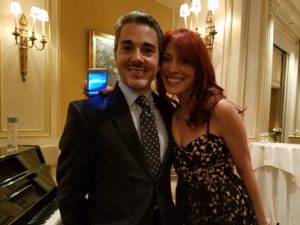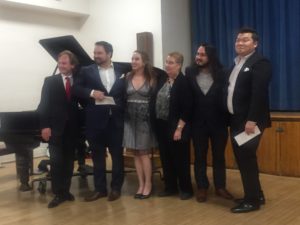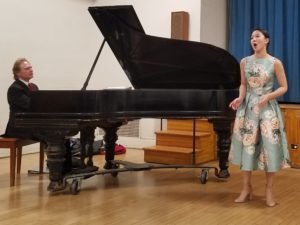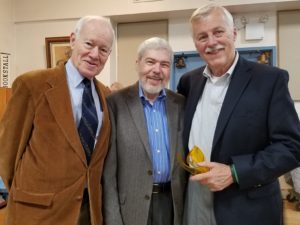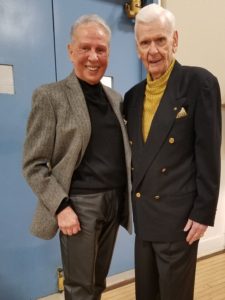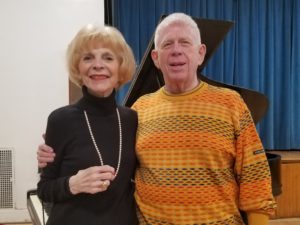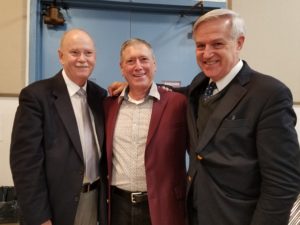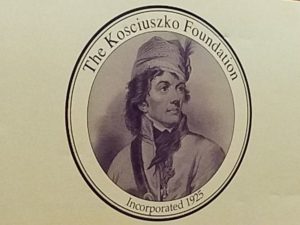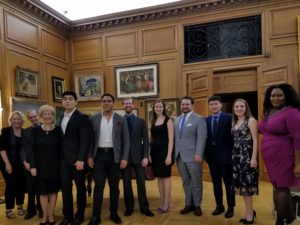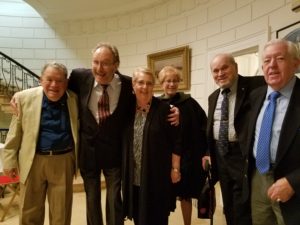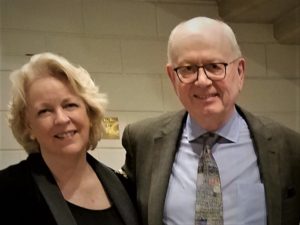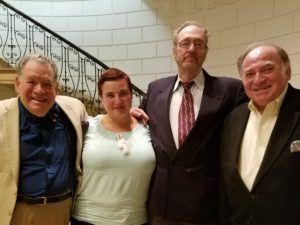
At the prestigious Lotos Club in New York City, Elysium between two Continents celebrated its 31st Annual Erwin Piscator Award. The luncheon on Thursday, April 5th honored J. T. Rogers, Broadway and political playwright and Jolana Blau, longtime Elysium supporter and its Vice President for her immense humanitarian efforts on behalf of arts and culture.
In the excellent program booklet, designed and edited by Michael Lahr, there is a message of greeting by The Lord Mayor of the University Town of Marburg, Germany where a house was opened in 2016 called the Erwin Piscator House entirely dedicated to culture. In Marburg, Erwin Piscator spent his formulative school years and after his return from exile in the United States. In 1951, he directed 4 plays with record attendance.” On behalf of the community of Marburg, I congratulate the honorary Piscator award recipient, the philanthropist Jolana Blau and this year’s Piscator award recipient, J.T. Rogers on this worthy distinction.” The booklet also had Best Wishes from New York Mayor Bill de Blasio. New York Governor Andrew Cuomo also sent a note of congratulations to J.T. Rogers and Jolana Blau.
Playwright/poet/ theatre director Bertolt Brecht said of his partner Erwin Piscator (1893-1966), “Piscator is the greatest theatre man of all time. He will leave a legacy which we should use.”
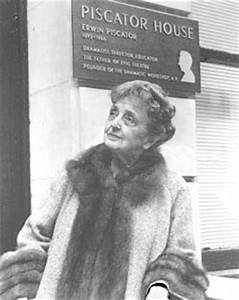
According to Erwin Piscator, “art only achieves its purpose when it contributes to the improvement of man” and “the purpose of theatre should not only be to teach us about the creative process, but to teach us of human relations, human behavior and capacities. It is to this task consciously and unconsciously, suggestively and descriptively, that the theatre is best suited.”

Gregorij H. von Leïtis, Founder and President of the Erwin Piscator Award and Michael Lahr, Chairman, work to benefit Elysium’s International Educational Programs in conjunction with The Lahr von Leïtis Academy and Archive that promotes “Art and Education without Borders.” These programs follow Erwin Piscator’s humanitarian goals to educate the next generation. Their light takes us out of a dark place. “Hate is a failure of Imagination” is a recurrent theme of Elysium and Gregorij von Leïtis and Michael Lahr have toured many countries to spread the word. They are like two brilliant planets that are a vital part of the positive success of our solar system.
The welcome followed by Gregorij H. von Leïtis, who truly relished seeing this beautiful afternoon develop with enlightenment like some wonderful garden of rare flowers.
Alexis Rodda opened the program with “An die Freude” (Ode to Joy) by Franz Schubert, with a text by Friedrich Schiller. Ms. Rodda’s splendid soprano soared and flooded the room with joyful abandon. Her excellent piano accompanist was Dan Franklin Smith.
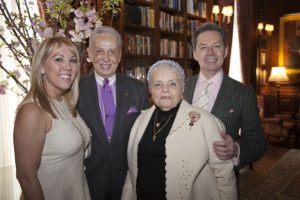
Chairperson Heather Randall welcomed the audience. Her late great husband was actor Tony Randall, an opera lover, whose wonderful praiseworthy comments on America’s great baritone Leonard Warren were in author Mary Jane Phillips Matz’s extraordinary biography of the great Verdi baritone from the Bronx. Warren’s brilliant career ended with his sudden death onstage during a performance of Verdi’s La Forza del Destino at the Metropolitan Opera in March 1960. Tony Randall had a long, vibrant acting career including “The Odd Couple” and was a master actor, especially in light comedy, equally deserving of the praise he gave to others. Ms. Randall’s brief comments were much appreciated by her many friends and admirers.”
“Schiffahrt” with music by Egon Lustgarten transferred us to a salon, matching the treasures of the Lotos Club. Lush voiced Alexis Rodda and her fleet fingered accompanist Dan Franklin Smith, evoked a past era, perhaps of cognac and a good cigar (Or a pastry with a dollop of whipped cream and a cappuccino).
Among the guests were representatives of several illustrious consulates stationed in New York: Miroslav Rames, Consul General of the Czech Republic, Jens Janik, Deputy Consul General of Germany, Julius Pranevicius, Consul General of Lithuania and Karel Smekal, Deputy Consul General of the Czech Republic. Lya Friedrich Pfeifer, Vice Chairperson and President of the Max Kade Foundation has been a wonderful supporter of Elysium between two continents as well as Mrs. E.L. Doctorow, whose brilliant late husband wrote Ragtime & Louise Kerz Hirschfeld Cullman, whose late husband was the illustrious illustrator/caricaturist Al Hirschfeld, whose works are all over Sardi’s Restaurant on Broadway in the theatre district and many other venues.
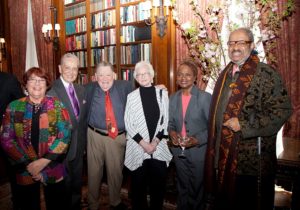
The elegant Michael Lahr made the introduction of André Bishop, Artistic Director of Lincoln Center Theatre, who was to make the award to famed playwright J.T. Rogers. Since Bartlett Scher, the international director of theatre and opera could not attend, Mr. Bishop happily filled in with an inspiring tribute to J.T. Rogers. Rogers gave a brief but truly touching response to an award that represents a lifetime of observing and creating plays such as the award winning Oslo at Lincoln Center and then Broadway and London that not only moved people, but in the right direction. His works have been staged throughout the United States and other venues and Rogers has received many acknowledgments of his work. Gregorij H. von Leïtis also spoke eloquently of the importance of such performances as Oslo and Blood and Gifts, which are in the tradition of Erwin Piscator. Judy and I chatted briefly with J.T. Rogers and he was the epitome of bonhomie and effervescence.
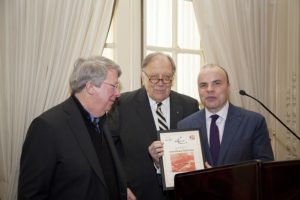
Michael Lahr then introduced distinguished Chev. Cesare L. Santeramo, who along with his lifetime partner Dr. Robert Campbell, have been at the fore of generosity of spirit and time and are lionized by all who know them. Cesare Santeramo introduced the awardee, Jolana Blau. Mr. Santeramo was a tenor of renown with the New Jersey State Opera and active with the Licia Albanese-Puccini Foundation. He also held a high position with Western Electric. His versatile career also included the Board of Opera Index, Let there be hope and Polish Assistance of New York. His is a vital and vibrant presence a past winner of the Piscator award, ever chic and ever head over heels with life, music and helping those in need.
Jolana Blau, a concentration camp survivor, who experienced the horrors of the Holocaust, was liberated in 1945.”It is so important to remember – therefore I am grateful for the work that Elysium is doing. The younger generation, through Elysium’s programs must learn the lessons from history.” Jolana Blau was awarded the Honorary Erwin Piscator Award in memory of Maria Ley Piscator – Erwin Piscator’s wife. After the Prague Spring in 1968, Jolana Blau and her daughter Simona, emigrated via Austria to the United States in 1972. Jolana married Vojtech Blau an antique rug and tapestry dealer whose company supplied rugs and tapestries worldwide and also to the White house. After Vojtech’s death in 2000, Simona Blau managed the company privately. Vojtech himself was also in a concentration camp. The labyrinth paths and twists of fate are written in the sands of time. It was a pleasure to meet Jolana Blau’s charming and appreciative two daughters, daughter- in-law and family. Kathryn Hausman, accompanied by two friends, presented Ms. Blau with a lovely floral bouquet.
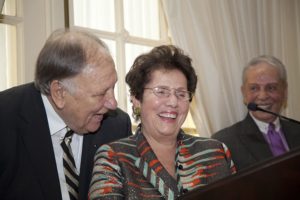
Soprano Alexis Rodda sang “Spiel auf Deiner Geige” by Robert Stolz with joyful abandon and dance “Here on the banks of the blue Danube, here in the beautiful Hungarian land, one sings other songs while drinking Tokay” (text by Alfred Grünwald/Ludwig Herzer and translation by Michael Lahr) and brilliantly accompanied by Dan Franklin Smith. Ms. Rodda was a vocal symbol of the strength and resilience of her songs. They spoke for the winners past and present who, despite obstacles beyond belief, have emerged with messages of freedom of expression and universal love.
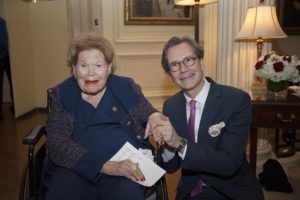
The names Gregorij H. von Leïtis and Michael Lahr are exalted and they are revered during their lifetimes. They are a force for the good. I leave with a quote from Gregorij H. von Leïtis, “I thank each of our honorees for the Erwin Piscator and Maria Ley Piscator awards, our guests, at the 31st Erwin Piscator award luncheon, our supporters friends and colleagues who join us on our way to create a world of creative and educational exchange and mutual friendship between the people of the United States and the world.” The award winners are immersed in their life’s work but hearing the praise will keep them aware that there are those who applaud, care and are motivated to do the right thing.
As we finished our delicious luncheon and went out into the chill of an uncertain April, we know that, thanks to Elysium – between two continents, Spring will come and the warmth of enlightenment will give us peace, joy and creativity in a milder, more gentle and giving world.

